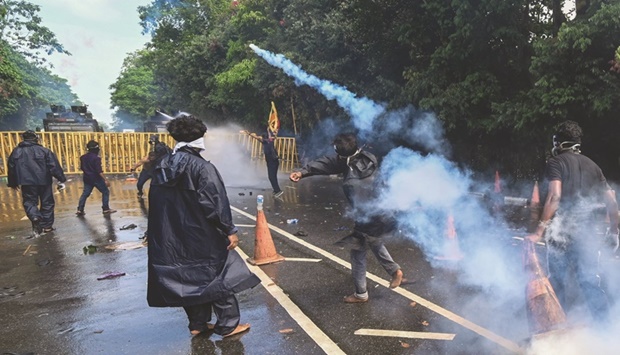Police again fired tear gas and water cannon at students trying to storm Sri Lanka’s parliament yesterday as the country was brought to a halt by a trade union strike demanding the government step down.
Months of blackouts and acute shortages of food, fuel and pharmaceuticals have caused widespread suffering across the nation of 22mn people.
Public anger has sparked sustained protests demanding the government’s resignation over its mismanagement of the crisis, Sri Lanka’s worst since independence in 1948.
Thousands of student protesters had been camped on the road leading to the legislature, which is on a man-made island on a lake in the capital Colombo, since Thursday.
Officers fired a barrage of tear gas followed by water cannon from two trucks, but the crowd quickly reassembled behind police barricades set up to block access to the parliament.
It was the second time police tried to disperse the crowd with tear gas, after an earlier unsuccessful attempt on Thursday afternoon.
Millions of workers stayed off the job yesterday in a strike organised by the country’s trade union movement, with all but one scheduled train service cancelled. Privately owned buses were off the roads while industrial workers demonstrated outside their factories and black flags were hung across the country in an expression of anger against the government.
“We can pinpoint the policy blunders of the president that led to this very sorry state of our economy,” said trade union leader Ravi Kumudesh. “He must go.”
Private buses, which account for two-thirds of the country’s fleet, were also off the road, Private Bus Operators Association chairman Gemunu Wijeratne said.

A demonstrator throws back a tear gas canister fired by the police to disperse university students protesting to demand the resignation of Sri Lanka’s President Gotabaya Rajapaksa over the country’s crippling economic crisis, near the parliament building in Colombo yesterday.
